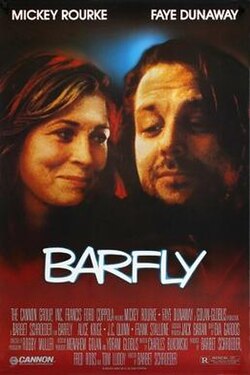Barfly (film)
| Barfly | |
|---|---|

Theatrical release poster
|
|
| Directed by | Barbet Schroeder |
| Produced by |
Presenter: Francis Ford Coppola Exec. producer: Menahem Golan Yoram Globus Producer: Tom Luddy Fred Roos Barbet Schroeder |
| Written by | Charles Bukowski |
| Starring | |
| Music by | Jack Baran |
| Cinematography | Robby Müller |
| Edited by | Éva Gárdos |
|
Production
company |
|
| Distributed by | Cannon Film Distributors |
|
Release date
|
October 16, 1987 |
|
Running time
|
97 minutes |
| Country | United States |
| Language | English |
| Budget | $3 million |
| Box office | $3,221,568 |
Barfly is a 1987 American comedy drama film directed by Barbet Schroeder and starring Mickey Rourke and Faye Dunaway. The film is a semi-autobiography of poet/author Charles Bukowski during the time he spent drinking heavily in Los Angeles. The screenplay by Bukowski was commissioned by the French film director Schroeder, and it was published (with illustrations by the author) in 1984, when film production was still pending.
The Kino Flo light, now a ubiquitous tool in the film industry, was specially created by Robby Müller's electrical crew for a scene in this film, which would have been difficult to light using the conventional lampheads available at the time.
The film was "presented by" Francis Ford Coppola, and features a silent cameo appearance by Bukowski himself. It was entered into the 1987 Cannes Film Festival.
Henry Chinaski (Mickey Rourke) is a destitute alcoholic who lives in a rundown apartment and works menial jobs when he can find them. An intelligent man and keenly aware of his circumstance, he finds solace in expressing his feelings and perceptions of the world through writing poetry and short stories which he submits to magazines and papers for a few extra dollars.
At night, he frequents a local establishment where he drinks, hangs out with other down and out alcoholics, and eventually gets into altercations with other patrons along with the tough guy bartender he hates, named Eddie (Frank Stallone). One night, Henry comes into the bar very drunk; he begins to drink uncontrollably out of other customers' glasses and Eddie promptly throws him out into the street telling him to never come back. Humiliated, the next day Henry wakes up determined to focus on beating Eddie.
During routine evening stops at the local bar, Henry constantly challenges Eddie, in a quest to prove to himself and others that he could beat the sober and tough talking bartender, who represents everything Henry despises, including shallowness and self-promotion. His regular fights with Eddie in the back alley behind the bar attract other bar goers who cheer for their favorite and place wagers on the fight. The bar owner, who has a soft spot for Henry and has faith in him, puts a wager on him to beat Eddie. This time Henry wins the fight, the Bar owner wins his bet which he then gives to Henry so that he can buy a couple drinks for the night. He then tells Henry that although he likes him, he is no longer welcome at the bar because of his disruptive activities, the fights with Eddie, and the harassment of the other bar-goers.
...
Wikipedia
